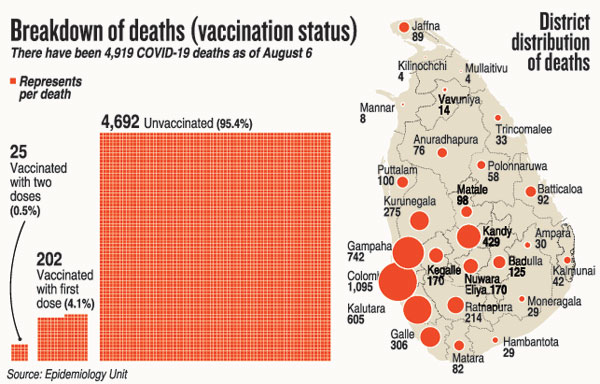News
Top national experts voice great concern
Sri Lanka could soon face a health crisis of “unprecedented” proportions, top national experts have warned, noting with “great concern” the current surge in COVID-19, nearly overwhelmingthe capacity of the health system to provide the required adequate care for the people.
These experts are in the Independent Expert Group convened by the World Health Organization (WHO) who met on Tuesday (August 10) for their 5th meeting.
Chilling projections by the Monash University, Australia, in collaboration with WHO’s South East Asian Region (SEAR) and the Sri Lanka Country Office had also been on the table during the meeting.
These projections have been based on notified cases and deaths using the Health Ministry’s Epidemiology Unit data and the assumption that 50% will be fully vaccinated by the end of August.
At the current levels of mobility
restrictions –
The number of cases would increase up to 6,000 cases/day by mid-September.
The deaths up to early October will come to a peak of around 220 deaths/day.
The ICU admission will peak around 275 by early October.
The cumulative death toll would be around 30,000 by January next year (2022) – that is in four months.
Note: As vaccine coverage as assumed in the model has not been achieved yet, the projections are an under-estimate.
At increased levels of stringency (similar to May-June 2021) for 4 weeks –
The country will have less numbers of cases of around 1000/day.
The deaths would be less than 25/day.
ICU care less than 25/day (by October 2021)
18,000 deaths would be averted by January 2022.
The detailed recommendations from these experts are:
Strictly enforce movement restrictions including on inter-district travel except for essential services. The effective implementation of these measures may require the enforcement of a curfew for a short period in large geographic areas or nationally.
Restrict/cancel all public events for 3 weeks.
Provide care and protect the health workers and augment staffing in hospitals to minimize disruption of essential health services.
Develop and implement an effective communication plan to engage the public and to update them on the control measures.
Accurate reporting of both cases and deaths to get a better picture of the ground situation. Proxy indicators such as the observed Test Positivity Rate (TPR),trends measured using weekly moving averages and time series analysis, mobility data,etc., could also be used.
Prioritize to vaccinate all those over 60 years and those with co-morbidities,preferably with Pfizer, Moderna or AstraZeneca because even a single dose of these vaccines provides some degree of protection.
The experts included Facilitator Dr. Palitha Abeykoon; Dr. Nihal Abeysinghe; Dr.Vinya Ariyaratne; Prof. Asita de Silva; Dr. Rajiva de Silva; Dr.Lak Kumar Fernando; Dr. Padma Gunaratne; Prof. Saroj Jayasinghe; Prof. Indika Karunathilake; Prof.Neelika Malavige; Prof. Kamini Mendis; Prof. Malik Peiris; Prof. Manuj Weerasinghe; and Dr. Ananda Wijewickrama.
The meeting was chaired by the WHO Representative to Sri Lanka, Dr.Alaka Singh and attended by a WHO team.
|
Urgent ‘act now to save lives’ recommendations The recommendations of the experts at a glance: We need to ACT NOW. Our urgent priority is to SAVE LIVES. Sri Lanka will avert about 18,000 deaths by January 2022 if the level of stringency is immediately increased, similar to May 2021 for 4 weeks. This will give the required time to accelerate vaccination and achieve the level of protection following the second dose of vaccines; as well as for the health system to recover from the overwhelming case load. They add: “Immediate actions are ‘crucial’ and ‘critical’ because it takes a few weeks before measures showa positive impact on the number of infections and hospital admissions. Any delay inimplementation will lead to an increase in deaths and will require even more stringent measures with longer duration to regain control.” | |


